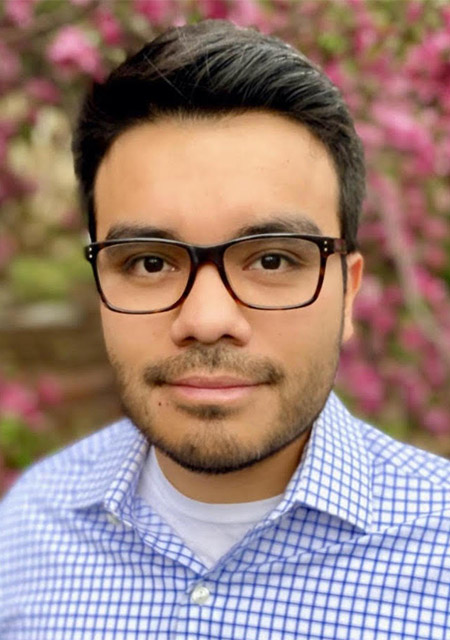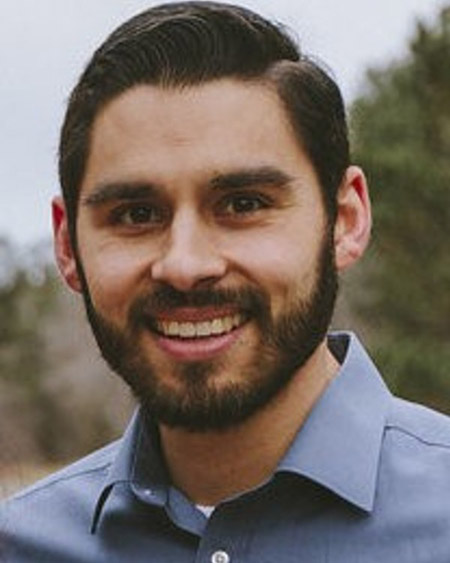2022 Dean's Research Associates
Meet the 2021-2022 Dean's Research Associates!
 Rene Crespin
Rene Crespin
Department of Economics
I am an applied microeconomist with interests at the intersection of education, public, and labor economics. I have developed a research portfolio focused on applying tools of causal inference and data science to examine levers that lessen or exacerbate inequality, such as education and immigration policies. In my first line of research, I study the intended and unintended consequences of actions taken by educational institutions. This includes the effects of releasing school social climate information, the effects of various affirmative action policies, and the effects of place-based educational policies on student outcomes, families school choice and residential decisions, as well as on teacher labor markets. In the second strand of my research, I examine the effects of hostile and welcoming immigration enforcement policies on undocumented immigrants’ and their families’ willingness to invest in their local economies through housing, consumption, and work, as well as the spillover effects of these policies. In both strands of research, I investigate how policies affect race/ethnic and economic inequality.
Reason for Applying
I was a Teaching Fellow with the American Economic Association’s Summer program (AEASP) when it was hosted by Michigan State University. This gave me the opportunity to meet professors from the economics department. Through this experience, I saw how committed MSU professors involved with AEASP were in making sure that undergraduate students from underrepresented backgrounds felt welcomed and valued for their perspectives. The Dean’s Research Associate program will provide me with the opportunity to contribute to creating a diverse, equitable, and inclusive environment and advance my research and teaching.
Rene Crespin has successfully transitioned into the tenure system.
 Ampson Hagan
Ampson Hagan
Department of Anthropolgy
I am currently the 2021-2022 African and African Diaspora Studies Dissertation Fellow at Boston College, and a PhD candidate in sociocultural anthropology at the University of North Carolina, Chapel Hill. My research broadly focuses on how Black African migrants crossing the Sahara Desert encounter and navigate the humanitarian and policing nexus that seeks to intercept them. Over the course of 12 months of ethnographic research with unauthorized migrants and inside a migrant camp in Niger, this research is the body of my dissertation, Deserving Humans in the Desert: How Black trans-Saharan Migrants Experience the Logics of Liberal Humanism via Humanitarian Care in Transit. Manuscripts based on this research are currently under review, however, samples of my research on race, health, and deservingness have appeared in Africa is a Country, Somatosphere, and Fieldsights of the Society for Cultural Anthropology. I have authored a forthcoming chapter in an edited volume, Black Geographies, that will explore the experience of migrants who are Black and out of place in Niger.
Reason for Applying
I applied to the College of Social Science Dean’s Research Associate Program at Michigan State University because it looked like it was one of a kind. The dedication to supporting and nurturing scholars from diverse backgrounds caught my eye, and the program's commitment to doing the work of putting scholars in positions to succeed, with institutional resources, intrigued me. Offering more than just words, the program has put in place institutional resources that will promote the development of scholars of color, and I am excited for the opportunity to grow as a researcher and a future faculty member at MSU.
Ampson Hagan has successfully transitioned into the tenure system.
 Kendall Morris
Kendall Morris
School of Social Work
I am a doctoral candidate at the Boston University School of Social Work. My research focuses on the effects of trauma and community violence, especially homicide, on the mental health of Black families and communities, as well as the mental health services and resources they utilize in response to traumatic loss and violent events. I seek to understand the individual, family, community, and systemic factors that contribute to higher homicide rates in Black communities and the bereavement and mental health issues that Black families and communities experience after a homicide and how surviving families and communities cope with traumatic loss. My research goals are to understand: 1) what factors contribute to community violence in Black communities; 2) the effectiveness of formalized bereavement services in Black communities; and 3) how to improve access to mental health services for Black individuals and families. I hope that my research will be used to inform the development of trauma-informed interventions for Black individuals and families who have experienced violence-based trauma. I have conducted several studies during my doctoral studies, focusing on community development that makes a deep impact on urban issues, racial/ethnic economic disparities, and state and municipal policies.
Reason for Applying
I applied to the Dean's Research Associate Program because Michigan State University is a place that has a long history of both addressing the needs of and serving the community. Because of Michigan State University’s College of Social Science’s mission to work everyday to make the world a better place, I believe that the school would be a great environment for me to develop my research and work with students, practitioners, communities and faculty. I am also excited about the commitment to training and supporting scholars from diverse backgrounds. I hope to gain a strong foundation for a successful career and academia, to contribute to the much needed literature on community violence, and to continue to contribute to increasing diversity, equity and inclusion in academic spaces.
Kendall Morris has successfully transitioned into the tenure system.
 Raul Rodriguez
Raul Rodriguez
Political Science
I am currently a Postdoctoral Scholar at the School of Civic and Economic Thought and Leadership at Arizona State University. I have writings that have appeared in venues such as the American Journal of Political Science (AJPS) and the journal of American Political Thought. The primary focus of my research is American liberal democracy, especially as it is examined in the writings of a French political philosopher named Alexis de Tocqueville. One of the central ambitions of my book project is to argue that a tentative return to Tocqueville’s writings is needed to clarify and understand the crisis of liberal democracy. Before we can understand why liberal democracy is in crisis, we must understand what liberal democracy is. Tocqueville, I argue, can teach liberal democracy to know itself. As a teacher, I seek to introduce students to the fundamental questions of human existence: What is justice? What is freedom? What is happiness? By reading the works of authors who have different answers to these enduring questions, I seek to foster lively debate and discussion in the classroom. In my experience, I have seen that this pedagogical approach can help students from all backgrounds access a genuinely inclusive and excellent education.
Reason for Applying:
I applied to the Dean’s Research Associate Program because I want to be part of a movement dedicated to making higher education more diverse, equitable, and inclusive. This program is a unique and important avenue by which young scholars of differing perspectives can be part of an interdisciplinary community dedicated to making excellent education available to all students. As a former high school Bilingual Social Studies teacher in Teach for America (TFA), I am firmly committed to this noble effort. Throughout my life, I have witnessed how caring mentors and teachers from different backgrounds can make a lasting impact on students and communities. By being part of this program, I look forward to deepening my understanding of inclusive pedagogy, scholarly research, and academic professionalization. Overall, I look forward to contributing to the culture of scholarly and teaching excellence at Michigan State.
Raul Rodriguez has successfully transitioned into the tenure system.

